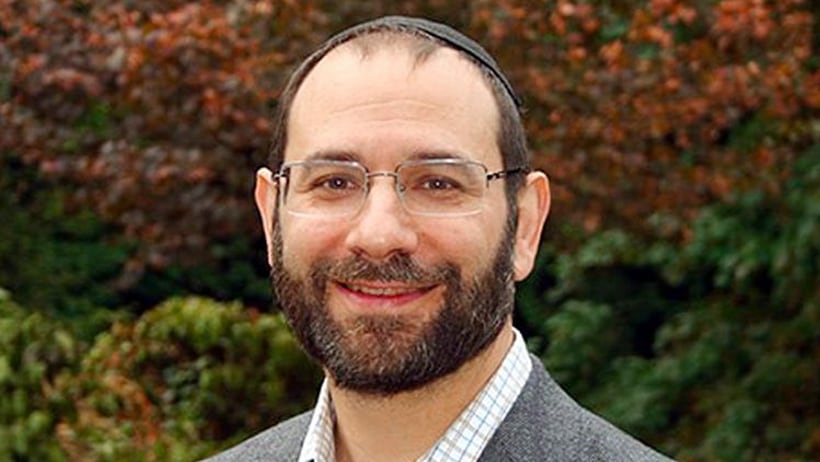Oasis Songs: Musings from Rav D
Friday, December 18, 2020 / 3 Tevet 5781
Summary: This has been a difficult week for our city, marked by gun violence. I share with you some reflections on the connection between hatred and imagination.
ESTIMATED READING TIME: 4 MINUTES
As I type these words, I am looking out the basement window and across the ravine, to where my neighbor’s deck is battened down for the winter. This is a seasonal view, obscured through most of the year by dense foliage. The vertical rails of their deck fence seem suddenly barren, and I am reminded of a Wallace Steven’s poem entitled “The Plain Sense of Things.”

He writes:
After the leaves have fallen, we return
To a plain sense of things. It is as if
We had come to the end of imagination,
Inanimate in an inert savior.
There is something profound about the way winter gathers, and how the disappearance of leaves lets us see things plainly—the neighbor’s deck I can’t see from spring till late November is now as plain as can be. What scratches at me is how Stevens understands that a plain sense of things deadens the imagination. I get it. When you see things straight on, and feel yourself deeply planted in the moment, what is, is. There is no role for imagination when thus grounded.
Simultaneously, the plain sense of things allows a different sense of imagination to surface—the sort where seeing clearly stimulates our compassion. There’s a line from a Graham Greene novel that I chose for my high school yearbook quote. “Hatred is just a failure of imagination.” This is such a powerful thought. When our compassionate imagination fails us, our ability to see others weakens. In that diminished light, a more primitive imagination arises, the blinding imagination of hatred. How easy it is to hate someone when you don’t know them, when you can’t imagine their lives, their motivations, their burdens and hopes.
These stark thoughts are occupying me because yesterday evening, there was a fatal shooting of a 20 year old female near North Vancouver Avenue and North Stanton Street. That is three blocks from where Pastor J.W. Matt Hennessee’s Vancouver Avenue First Baptist Church is located. Pastor Hennessee was just with us last week. So this murder touches close. What leads someone to look at another person, and see only a target for a bullet? An end of imagination? An inability to consider their world?
Unfortunately, this murder was not an isolated incident.
Last Saturday, an Uber driver was murdered. He was 23. On Monday, a 19 year old boy was killed in Gresham and earlier in the day, a 16 year old was murdered in Southeast Portland. This is hardly a complete list. So much darkness as our year moves to an end, after the leaves have fallen. So many young lives lost. So much promise erased. An end of imagination.
When historical pressures forced our founding congregations to merge, and seek a new building, downtown was no longer affordable. Additionally, the city exerted its power of eminent domain, razing the heart of the Jewish community for its South Portland Urban Renewal project.
At the time, Ahavai Shalom was located at SW 13th and Market. We ended up where we did in large part because land was inexpensive and the area was still being built out. Because of that accident of history, we also ended up in a place of trees and leaves, in a safe neighborhood. As far as I can figure, Hillsdale wasn’t part of the city’s distressing racial land covenants or redlining, but we still ended up buffered from social unrest, poverty and the violence that arises when hope gives way to hopelessness.
But this past week is an invitation to see the plain sense of things. Our city is hurting. This beautiful city, planted at the confluence of two great rivers, isn’t working for all of its citizens. It can’t even keep its youth alive.
It would be easy to read despair and anger into these words. And yes, I feel angry and pained. Thankfully, that’s not all I feel. Moreover, despair isn’t something I am giving in to, and I hope you won’t either.
Instead, I hope you hear an invitation to combine a plain sense of things with imagination of what still can be. If you have the means, maybe you’d consider ordering take out food from a black-owned business. If you have a car and can afford it, maybe this week is a good time to drive through neighborhoods you don’t normally visit. Please keep an eye out for the community section of our weekly email for other opportunities to connect with our neighbors of color. A couple of congregants—Jenn Knudsen and Steve Sirkin are working with staff to share that information with you.
The lights of Hanukkah are fading quickly, almost as quickly as the light of our young neighbors who lost their lives this week. Yet the spirit of Hanukkah has never gone out. Each of us is a candle. Each of us has the capacity to act, to refuse to be an inert savior. As some different poets wrote, “Don’t let the light go out, it’s lasted for so many years.”
Shabbat shalom on this 8th day of Hanukkah,
Rav D
Shabbat Table Talk
- At a dark moment in your life, what helped illuminate your way?
- There’s a custom to bring one Jewish holiday into the next. For example, some people saved the palm frond from their Sukkot Lulav and used it to burn their Passover Hametz. What will you carry with you from this year’s Hanukkah?
- Imagination is so powerful and essential. How often do you allow yourself to daydream?
If you’d like to continue this discussion, follow this link to CNS’s Facebook page to share your own perspectives on the topics raised in this week’s Oasis Songs. Comments will be moderated as necessary.



